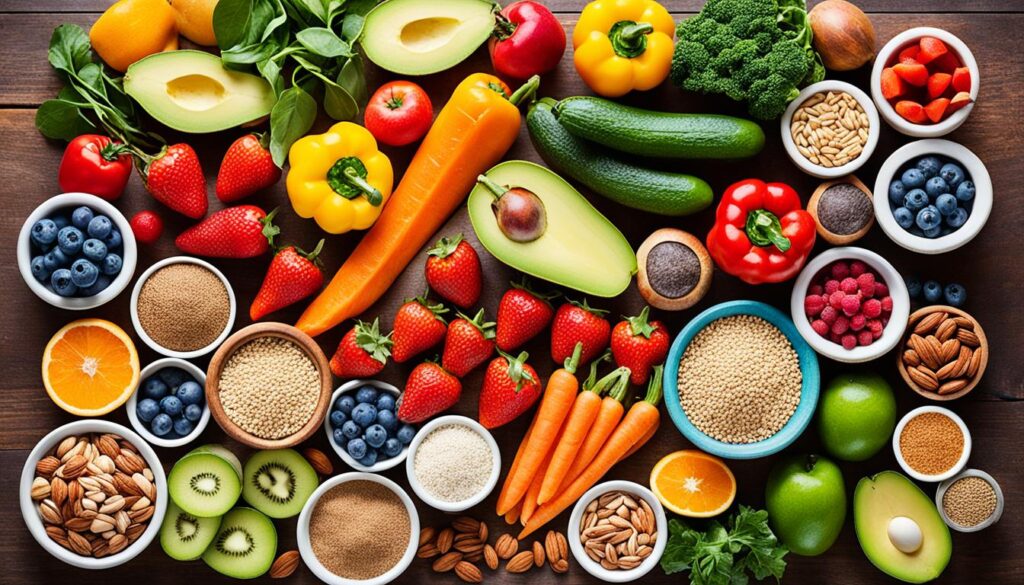Starting a sugar-free diet can be tough, as sugar is in many foods and drinks. But, the good things about it can really boost your health. Cutting down on sugar can make you feel more energetic and lower your risk of serious health problems like heart disease and diabetes.
It can also help with losing weight and keeping it off. Plus, it’s good for your brain, making you think better and remember things easier. It might even help you feel less anxious or depressed.
Going sugar-free takes effort, but it’s worth it for your health. The benefits are big and can change your life for the better.
Key Takeaways : Sugar Free Diet
- A sugar-free diet can lead to increased energy and reduced risk of serious diseases
- Adopting a sugar-free lifestyle can promote weight loss and weight management
- A sugar-free diet has been linked to improved cognitive health and better memory
- Transitioning to a sugar-free diet requires determination, but the potential health benefits are significant
- Reducing refined sugar intake is a worthwhile endeavor for overall well-being
Introduction to a Sugar-Free Diet
A sugar-free diet means eating less or no added sugars. It doesn’t mean avoiding sugars in fruits and dairy. The main goal is to reduce sugars in foods like sweets, drinks, and baked goods.
What is a Sugar-Free Diet?
This diet cuts out added sugars like white sugar and high fructose corn syrup. It focuses on whole foods that are naturally low in sugar. Foods like veggies, lean meats, and healthy fats are key.
The goal is to avoid sugars often found in packaged foods. This helps manage weight and boosts health.
Why Reduce Sugar Intake?
Less sugar means more energy and a lower risk of diseases like type 2 diabetes and heart disease. It also helps with weight control and improves mental health.
It can make you think better, remember more, and learn faster.
“Limiting sugar intake is one of the most effective ways to improve your health and well-being. A sugar-free diet can have a transformative impact on your physical and mental well-being.”
Learning about a sugar-free diet and its benefits can lead to a healthier life.
Physical Benefits of a Sugar Free Diet

Going sugar-free can boost your health in many ways. One big plus is increased energy levels. Sugary foods and drinks give you a quick energy boost, but then your energy drops. This leaves you feeling tired and unfocused.
A diet without sugar focuses on slow-burning carbs and proteins. This gives you energy that lasts, without the ups and downs in blood sugar.
Reduced Risk of Serious Diseases
Less sugar means a decreased risk of serious health conditions. Too much sugar is linked to type 2 diabetes, heart disease, and some cancers. Cutting sugar out lowers your risk of these diseases, making you healthier overall.
Weight Loss and Weight Management
A sugar-free lifestyle helps with weight loss and management. Sugary foods and drinks are high in calories and can lead to weight gain. By avoiding added sugars, you can eat fewer calories, which helps you lose weight. Plus, it keeps your blood sugar stable, reducing cravings and helping you eat healthier.
“Cutting out sugar has been one of the best decisions I’ve made for my health. I’ve noticed a significant increase in my energy levels, and I feel so much more in control of my weight.”
Choosing a sugar-free diet has big health benefits. You’ll see more energy, less risk of disease, and better weight control. This change can greatly improve your health and happiness.
Mental Benefits of a Sugar Free Diet

Going sugar-free can boost your mental health as well as your physical health. Studies show that eating less sugar can make your brain work better. It can improve your memory and help you learn new things.
Improved Cognitive Health
Too much sugar can hurt your brain. It can make it hard to focus, shorten your attention span, and increase the risk of serious brain diseases. But, eating less sugar can make your mind clearer and your memory sharper.
It helps your brain work better by reducing sugar resistance and balancing neurotransmitters. This lets your brain do its best work.
Better Memory and Learning Skills
A diet without sugar can also make you smarter. Improved cognition from low sugar intake means you’ll remember things better and solve problems more easily. This is great for students and anyone who needs to think clearly at work.
By eating less sugar, you can make your brain work its best. This can help you reach your goals with less effort. The mental benefits of a sugar-free diet make it a good choice for many people.
Sugar Free Diet

Starting a sugar-free diet doesn’t mean you have to give up sweetness. There are many natural and healthy sugar substitutes that can help. These include stevia, honey, maple syrup, dates, yacon syrup, and monk fruit sweetener. You can use these in cooking, baking, and drinks to make tasty, sugar-free diet food.
Healthy Alternatives to Sugar
- Stevia – A zero-calorie, plant-based sweetener that is significantly sweeter than sugar.
- Honey – A natural, minimally processed sweetener that contains antioxidants and other beneficial compounds.
- Maple Syrup – A rich, flavorful sweetener that is also a source of minerals like zinc and manganese.
- Dates – Dried fruits that are naturally sweet and high in fiber, vitamins, and minerals.
- Yacon Syrup – A low-calorie sweetener derived from the yacon plant that is rich in prebiotic fiber.
- Monk Fruit Sweetener – A zero-calorie sweetener made from the monk fruit, which is 150-200 times sweeter than sugar.
Foods to Eat and Foods to Avoid on a Sugar-Free Diet
When on a sugar-free diet food list, focus on whole, minimally processed foods. Avoid foods to avoid on sugar free diet, like added sugars, sweetened drinks, and processed snacks. Some sugar-free diet food options include:
| Foods to Eat | Foods to Avoid |
|---|---|
|
|
By choosing healthy sugar substitutes and sugar-free diet food, you can satisfy your sweet cravings. This supports your overall health and wellness goals.
Also Read : Choosing The Right Diet To Banish Belly Fat
Conclusion
Going sugar-free can change your health and happiness for the better. Cutting down or out sugar brings many benefits. You’ll feel more energetic, lower your risk of serious illnesses, and help with weight control.
You’ll also see better brain function, memory, and learning. Plus, you’re less likely to feel anxious or depressed. This diet change helps in all parts of life, making daily tasks and big goals easier.
Choosing a sugar-free diet is a personal choice, but the benefits are clear. It helps you manage your health, increases energy, and prepares you for a healthier future. Cutting sugar is a smart move for your well-being.
FAQs
Q. What is a sugar-free diet?
A sugar-free diet means eating less or no added sugars. You don’t have to cut out sugars in foods like fruits and dairy. But, you should avoid sugars added to foods, drinks, and sweets.
Q. What are the benefits of following a sugar-free diet?
Eating less sugar can make you feel more energetic. It can also lower your risk of serious health problems like heart disease and diabetes. Plus, it can help with weight control and improve your mental health.
It can make your brain work better, help with memory and learning, and reduce stress and sadness.
Q. What are some healthy alternatives to refined sugar?
There are many natural sweeteners that are better than refined sugar. Options include stevia, honey, maple syrup, dates, yacon syrup, and monk fruit sweetener. These can be used in cooking and baking to make tasty, sugar-free treats.
Q. What foods should be avoided on a sugar-free diet?
A sugar-free diet means avoiding foods with added sugars. This includes sugary snacks, candies, sodas, fruit juices, and many packaged foods. It’s important to read labels and choose whole foods more often.
Q. How can a sugar-free diet improve cognitive health and function?
Eating too much sugar can harm your brain and increase the risk of Alzheimer’s disease. Cutting down on sugar can boost your brain health. It helps prevent insulin resistance and balance brain chemicals.
Source Links
- https://www.health.com/nutrition/health-benefits-quitting-sugar
- https://www.healthline.com/nutrition/30-days-no-sugar
- https://www.openaccessgovernment.org/physical-and-mental-health-benefits-of-a-sugar-free-diet/146723/








Leave A Comment